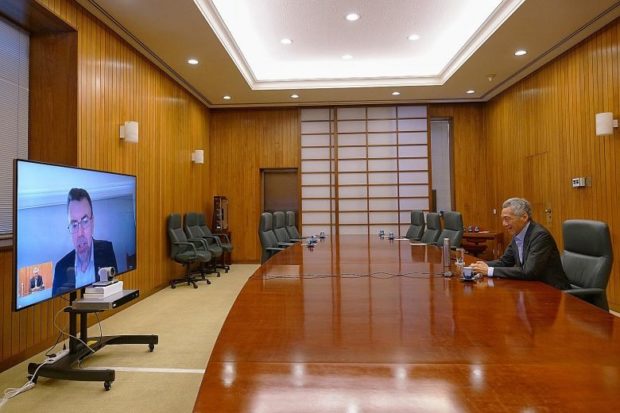Tide yet to turn for coronavirus situation in Singapore, says PM Lee

Prime Minister Lee Hsien Loong being interviewed by Mr Greg Sheridan from The Australian newspaper via Skype last Friday. PM Lee will speak to his Australian counterpart Scott Morrison today. PHOTO: MCI via The Straits Times/Asia News Network
SINGAPORE — While Singapore has been praised for its handling of the coronavirus situation, the government is under no illusion that the problem is over, Prime Minister Lee Hsien Loong has said.
The government has done its best to tackle the virus – on the medical front, through social measures and with public reassurance – while it balances keeping Singapore’s borders safe with maintaining essential trade and cooperation with other countries, PM Lee said in an interview with The Australian newspaper last Friday.
“If I made an analogy, it is not that the tide has turned, it is that we put the dykes up,” PM Lee said.
“We are watching very carefully to see where water may leak in, and if you take your eyes off it for a moment, suddenly I have an outbreak, like what happened in South Korea, and I will be in a perilous situation.
“It can happen to us at any time,” he added.
Article continues after this advertisementPeople should expect the virus to persist for “quite some time” based on current evidence, said PM Lee, as the virus continues to be a global problem despite successes in keeping cases down in individual countries.
Article continues after this advertisementThe coronavirus “is going to catch fire in many countries, and is going to take a long time to burn out”, he added.
“What you can hope for is that you control the spread of the disease, you hold the position, and hope and pray that the scientists come up with either a treatment or a vaccine within a year or two,” he told the newspaper, ahead of a video call with his Australian counterpart Scott Morrison today.
Like Singapore, each country has to find its own balance to prevent “the doomsday scenario, namely that the disease goes through the whole population”.
“Either it is going to leave you with huge casualties or it is going to take forever, and to lock down forever,” he said.
“I think it is an enormous economic cost and human cost too.”
Asked about Singapore being considered the most successful country in dealing with the coronavirus, PM Lee said the Republic has been reasonably successful at hindering the transmission of Covid-19, despite being a densely populated island, because of good social trust, ample medical capacity and extensive contact tracing.
The country has worked very hard to contact-trace once it detects a case, and to put immediate contacts either on notice or on quarantine depending on if they displayed symptoms. To date, several thousand people have been contact-traced, he noted. “It is labour intensive, but it is helpful in preventing one single case from becoming many hundred cases, if you catch it in time,” he said.
While social capital and trust in the Government have been key, these assets have to be built upon during a crisis or they will erode very quickly, he added.
This is why Singapore has a multi-ministry task force and almost-daily press conferences “to bring people up to date and to prepare people when something particularly significant or surprising happens”, he said.
Without such transparency and engagement, the public will begin to doubt what they are told or think that facts are being withheld and “you will be in trouble very quickly”, said PM Lee.
He will speak to Mr Morrison today via video link, and the two countries will sign a slew of agreements to deepen the bilateral relationship. Among these are a treaty to strengthen defence cooperation and enhance the Shoalwater Bay Training Area (SWBTA) in Queensland.
This year marks the 30th anniversary of Exercise Wallaby, the Singapore Armed Forces’ (SAF) largest annual overseas drill, which takes place at SWBTA. The current training area is about four times the size of Singapore, allowing the SAF to conduct large-scale and complex training not possible at home.
Agreements on digital economy cooperation and scientific cooperation on research of the virus that causes the Covid-19 disease are among others to be inked.
During the interview, PM Lee pointed out that Singapore and Australia have a close relationship and are like-minded countries that have gone through thick and thin together. “We would like to keep that friendship for a very long time to come,” he said.
For more news about the novel coronavirus click here.
What you need to know about Coronavirus.
For more information on COVID-19, call the DOH Hotline: (02) 86517800 local 1149/1150.
The Inquirer Foundation supports our healthcare frontliners and is still accepting cash donations to be deposited at Banco de Oro (BDO) current account #007960018860 or donate through PayMaya using this link.